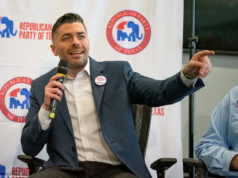“One of their people was sitting right here on this couch and talking to me, and he said, ‘This is going to be minimal, we’re going to take only the trees we need to take out to get our equipment down there,’ ” she recalled.
And then?
“And then they came in and did just exactly what the first guy said they were going to do,” Bason said. “Shame on them.”
Oncor isn’t required to replace trees, but it made an offer to this community.
“We’re committed to replanting vegetation within strategic areas within our easement,” Ozuna said.
When told that residents remained unhappy and felt as if Oncor had deceived them, Ozuna defended the amount of clear-cutting along Oakhurst Scenic.
“All the clearance that we’ve done in our easement has been to safely reconstruct and replace existing transmission towers,” he said. “Part of that process is laying that transmission tower down so we can take it apart. All the clearing has been to [allow the company to] safely operate within that space.”
Ozuna said the company offered to replace a small section of trees near the road, but none of the trees to be planted would grow taller than 15 feet. And, Bason said, the company said it wouldn’t be watering them.
Fort Worth residents have frequently criticized Oncor for its chainsaw-wielding forays into neighborhoods to clear away trees growing near its power lines. Branches can cause power outages, fires, or other unsafe situations if they touch power lines. Oncor has the right to cut away that growth and to keep clear a 25-foot easement on either side of its power lines. Often those easements extend onto private property.
Oncor is the state’s largest deliverer of electricity. Formerly called TXU Electric Delivery, Oncor became its own entity after Texas de-regulated electric utilities in 2002. The company provides transmission and distribution service to millions of customers across Texas, using more than 100,000 miles of power lines. The state’s Public Utility Commission regulates the company in Texas but provides few standards for pruning or clearing trees. Oncor, based on its past performances, typically shows little regard for a tree’s resulting appearance or health. Company officials have long said their primary concerns are reliable electric service and public safety.
The trees on Oakhurst Scenic are far beneath the power lines stretched atop the towers. Ozuna said Oncor needed to clear-cut the trees to move in heavy equipment, erect new towers, and take out old ones.
Some of the cutting that’s already been done appears unnecessary to Oakhurst residents. Bason points to a steep hill near her driveway that was cleared.
“What kind of equipment are they going to drive up this incline?” she said. “You couldn’t even drive a four-wheeler up there. They just did it because they could.”
The neighborhood has spent the last few years haggling with TxDOT and city leaders about the I-35 expansion and its encroachment on the neighborhood. Several residents said nobody ever mentioned the need to replace the towers and cut down trees.
“It’s strange that a company like that can come onto private property and do that kind of destruction and walk away and leave it and not have to do anything,” Bason said. “Oncor has way too much power in the state of Texas.”












I hope some takes this to the US Supreme Court, ONCO employees and executives are bullys
and they need to be disolved and bankrupt.
Mr. Prince: I read with interest and disgust your article, “Too Much Power,” in the Feb 11 edition of the Fort Worth Weekly. An informative write-up on an all too-common occurrence here in north Texas.
The issue here is the legal interpretation of property rights. When one combines politics, jobs, economic growth, and Eminent Domain (another grossly mis-used legal device), the institution of property rights is non-existent because it cannot deal with a core by-product of economic growth based on the profit motive–negative spillover effects. The problem is most acute here in Texas (and in north Texas in particular) because of the rarest of resources, open land. Big companies like Oncor and most (all?) land developers use the law to rape the land. And we see that court judges and city leaders are all too-willing to go along. How many times have injustices like this appeared in the press and TV in recent years? A chronilogical history of these incidents in Texas alone would make for good reading.
I have no hope for the land in Texas (and elsewhere). The root cause is too many humans and their leaders who think the earth and its environment are inexhaustible resources. This mind-set is encouraged by the institution of private property properly tweaked by Eminent Domain. Humans are not going extinct (see Paul Erlich’s 1970 book, The Population Bomb), hence the rape of the land will continue at an exponential pace. We have no concept of balanced, sustainable growth where open farm land or a stand of old-growth trees is more valuable than a new strip shopping center or a high-speed railway. This mind-set is continued via the passing of the land from the older family to the younger family benefactors. The latter are more than willing to sell off a parcel here and a parcel there to the vulture developers for the upfront cash. The fiction of private property is further erased. And technology cannot reverse the situation and in fact may promote it.
That’s the problem–too many people now and way too many in the future with a legal institution abetting the situation in a way it was never intended. A book of insightful thoughts in this regard can be read in Beyond Growth: The Economics of Sustainable Development by visionary, Herman E. Daly, Beacon Press.
Good writing. I’ll look for more of your articles.
I personally wretch each time I pass Oakhurst Scenic Drive and see the loss of trees and native vegetation.
In 1980 and 1985, I planted oak trees in the Oakhurst Bluebonnet Common Area to honor the births of my sons, Josef and Mikael. I hauled water in 5 gallon buckets to get the trees established. Later a water tap and an irrigation system were installed. The trees flourished.
Recently however, during the most devastating drought of the century, Libby Willis and Ginger Bason, as president and vice president of Oakhurst Neighborhood Association, for various reasons, decided to not allow irrigation at this site. I verbally begged, pleaded, cursed, cried, and then wrote letters and emails asking them both to please allow irrigation — all to no avail.
During this time, both of my sons for whom the trees had been planted, were diagnosed with devastating illnesses. Saving the trees became a mission for me. My husband and I found out we could adopt the area and personally assume financial responsibility for the water bill and upkeep – we did. We now maintain the area and water according to the City of Fort Worth’s watering schedule. Once we feel confident the trees we planted in the 1980’s have been stabilized, we plan to plant another tree.
As I stated earlier, it makes me ill to see the loss of trees anywhere — especially in our beautifully treed neighborhood. Because of this loss, I am sad for Ginger. Unfortunately, now each time she enters the street to her home, she will be reminded how abuse of power and abusive actions often times have far reaching effects on people and the things they love and cherish.
I really can sympathize with all the people that has commented on this article. However, when those huge trees and the wind we have here in Texas caused you to not have power for weeks on end you would be upset about that also. At some point there has to be a happy medium between big business and consumers. I hope that somewhere down the line you guys can find that place, unfortunately everyone will never be happy at the same time.